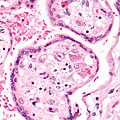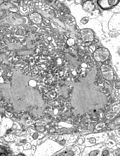Difference between revisions of "Viruses"
Jump to navigation
Jump to search
(→Human papillomavirus: split out) |
|||
| Line 1: | Line 1: | ||
This article deals with '''viruses'''. The more general topic of infective things is dealt with in [[microorganisms]]. | This article deals with '''viruses'''. The more general topic of infective things is dealt with in [[microorganisms]]. | ||
Many viruses afflict humans. Only a few of them can be diagnosed histologically. | Many viruses afflict humans. Only a few of them can be diagnosed histologically. | ||
[[cancer viruses|Several viruses cause cancer]] and seen directly or indirectly by pathologists frequently. | |||
==Viral inclusions - types== | ==Viral inclusions - types== | ||
Latest revision as of 15:43, 9 December 2021
This article deals with viruses. The more general topic of infective things is dealt with in microorganisms. Many viruses afflict humans. Only a few of them can be diagnosed histologically.
Several viruses cause cancer and seen directly or indirectly by pathologists frequently.
Viral inclusions - types
Cowdry types:[1]
- Cowdry type A inclusion:[2]
- Round eosinophilic material surrounded by a clear halo.
- Cowdry type B inclusion:[3]
- Neuropathology thingy. (???)
Images:
Viruses
Herpes simplex virus
- In the context of gynecologic cytopathology see: Gynecologic_cytopathology#Herpes_simplex_virus.
- Abbreviated HSV.
General
Several subtypes:
- Canker sores - usually HSV-1.
- Genital herpes - usually HSV-2.
Histology/cytology
Features:[4]
- Clear "ground glass" nuclei.
- Rim of peripheral chromatin.
- Nuclear inclusions.
- Multinucleation with nuclear molding, i.e. multiple nuclei that touch over a large surface area.
Mnemonic - 3 Ms: Margination, Multinucleation, Molding.
Images
www:
IHC
- HSV-1 +ve (cytoplasmic and strong nuclear).
- HSV-2 +ve.
Images:
Cytomegalovirus
- Abbreviated CMV.
- For pneumonia caused by CMV - see Cytomegalovirus pneumonia.
- For colitis caused by CMV - see Cytomegalovirus colitis.
General
- The name comes from the microscopic appearance.
- One of the TORCH infections.
- May cause fetal hydrops and intracerebral hemorrhage.[7]
Microscopic
Features:
- Very large nucleus (as the name implies) with clearing.
- Classically described as owl's eye-like.
- Granular cytoplasmic inclusions (red on H&E sections).
Notes:
- Classically in endothelial cells.
- In the context of esophageal ulcers, it is therefore useful to biopsy the base of the ulcer - if this is suspected.
Images
CMV placentitis. (WC)
CMV encephalitis. (WC)
www:
- CMV - owl's eye-like (asm.org).
- CMV - case 1 - several images (upmc.edu).
- CMV - case 2 - several images (upmc.edu).
IHC
- IHC for CMV is available - highlights granular cytoplasmic inclusions; increases sensitivity.
Human papillomavirus
- Abbreviated HPV.
Main article: Human papillomavirus
Adenovirus
General
- Common in kids - usually a mild respiratory infection with fever and pharyngitis.
- Can cause post-infectious bronchiolitis obliterans.[8]
- May be seen in the context of (adenovirus) appendicitis.
Microscopic
Features:
- "Smudge" cells[9] - black/blue blob ~ 10-15 micrometers. (???)
Notes:
Images:
- Adenovirus (medscape.com).[10]
- Smudge cell (medpedia.com).
- Necrosis in germinal centre - low mag. (flickr.com).
- Viral inclusions - high mag. (flickr.com).
- IHC for adenovirus (flickr.com)
- Adenovirus encephalitis - several images (upmc.edu).
Parvovirus
- AKA Parvovirus B19.
General
- Most significant in pregnant women.
- Parvovirus attacks the nucleated RBCs of the fetus - causes an aplastic anemia.
- May cause collapsing glomerulopathy.[11]
Trivia:
Microscopic
Features:
- Glassy (red) nuclear inclusions.[14]
- Nuclear enlargement.
Images
www:
- Parvovirus (fujita-hu.ac.jp).[15]
- Parvovirus - placenta - (scielo.br).[16]
- Parvovirus - several images (fujita-hu.ac.jp).
Epstein-Barr virus
Main article: Epstein-Barr virus
Polyomavirus
Main article: Polyomavirus
Human herpesvirus-8
Main article: Human herpesvirus-8
West Nile virus
- Abbreviated WNV.
General
- Uncommon pathologen.
Clinical:
- Fever.
- Muscle weakness.
Microscopic
Features:[17]
- Perivascular clusters in grey and white matter:
- Mononuclear infiltrates (lymphocytes, plasma cells).
- Microglial nodules (macrophage clusters).
Measles virus
General
- Causes Measles.
- Should not be confused with Rubella (AKA German measles).
- Uncommon due to widespread MMR vaccine.
- However increasing in the last years most likely due to insufficient vaccination.
- May develop weeks to years after infection.
- Illness may be complicated by subacute sclerosing panencephalitis (SSPE) - a chronic neurodegenerative condition.[18]
Microscopic
Features:
- +/-Intranuclear Cowdry type A inclusions.
- Glassy (pink) nucleus.
- Lymphocytes and macrophages (microglial cells).
- May be mild in in measles inclusion body encephalitis.
- Multinucleated cells.
- Microglial nodules.
- Demyelination.
- Gliosis.
Notes:
- Measles inclusions are intranuclear. RSV inclusions are intracytoplasmic.[citation needed]
Images
Rabies virus
General
- Causes rabies.
Virus affects:[19]
- Cerebral cortex.
- Hippocamus pyramidal cells.
- Purkinje cells.
Microscopic
Features:
- Negri bodies:
- Dense-appearing eosinophilic cytoplasmic bodies with a pale halo.
Images
www:
See also
References
- ↑ URL: http://www.pathconsultddx.com/pathCon/largeImage?pii=S1559-8675%2806%2970864-6&figureId=fig3&ecomponentId=mmc3. Accessed: 12 January 2010.
- ↑ URL: http://www.whonamedit.com/synd.cfm/3495.html. Accessed on: 22 January 2010.
- ↑ http://www.whonamedit.com/synd.cfm/3496.html. Accessed on: 22 January 2010.
- ↑ SM. 11 January 2010.
- ↑ URL: http://path.upmc.edu/cases/case120/dx.html. Accessed on: 28 February 2013.
- ↑ URL: http://www.antibodies-online.com/antibody/100405/anti-Herpes+Simplex+Virus+1+HSV1/. Accessed on: 28 February 2013.
- ↑ Tongsong, T.; Sukpan, K.; Wanapirak, C.; Phadungkiatwattna, P. (2008). "Fetal cytomegalovirus infection associated with cerebral hemorrhage, hydrops fetalis, and echogenic bowel: case report.". Fetal Diagn Ther 23 (3): 169-72. doi:10.1159/000116737. PMID 18417974.
- ↑ Aguerre, V.; Castaños, C.; Pena, HG.; Grenoville, M.; Murtagh, P. (Dec 2010). "Postinfectious bronchiolitis obliterans in children: clinical and pulmonary function findings.". Pediatr Pulmonol 45 (12): 1180-5. doi:10.1002/ppul.21304. PMID 20717912.
- ↑ URL: http://www.pathguy.com/lectures/infect.htm. Accessed on: 8 July 2010.
- ↑ URL:http://www.medscape.com/viewarticle/438534_2. Accessed on: 8 July 2010.
- ↑ Schwimmer, JA.; Markowitz, GS.; Valeri, A.; Appel, GB. (Mar 2003). "Collapsing glomerulopathy.". Semin Nephrol 23 (2): 209-18. doi:10.1053/snep.2003.50019. PMID 12704581.
- ↑ Cossart, YE.; Field, AM.; Cant, B.; Widdows, D. (Jan 1975). "Parvovirus-like particles in human sera.". Lancet 1 (7898): 72-3. PMID 46024.
- ↑ Servey JT, Reamy BV, Hodge J (February 2007). "Clinical presentations of parvovirus B19 infection". Am Fam Physician 75 (3): 373–6. PMID 17304869. http://www.aafp.org/afp/991001ap/1455.html.
- ↑ URL: http://www.pathguy.com/lectures/infect.htm. Accessed on: 8 July 2010.
- ↑ URL:http://info.fujita-hu.ac.jp/~tsutsumi/case/case210.htm. Accessed on: 8 February 2011.
- ↑ URL: http://www.scielo.br/scielo.php?pid=S0036-46652007000200007&script=sci_arttext. Accessed on: 18 August 2011.
- ↑ Sampson, BA.; Ambrosi, C.; Charlot, A.; Reiber, K.; Veress, JF.; Armbrustmacher, V. (May 2000). "The pathology of human West Nile Virus infection.". Hum Pathol 31 (5): 527-31. PMID 10836291.
- ↑ URL: http://path.upmc.edu/cases/case595/dx.html. Accessed on: 26 January 2012.
- ↑ Lefkowitch, Jay H. (2006). Anatomic Pathology Board Review (1st ed.). Saunders. pp. 424 Q36. ISBN 978-1416025887.
- ↑ Nuovo, GJ.; Defaria, DL.; Chanona-Vilchi, JG.; Zhang, Y. (Jan 2005). "Molecular detection of rabies encephalitis and correlation with cytokine expression.". Mod Pathol 18 (1): 62-7. doi:10.1038/modpathol.3800274. PMID 15389258. http://www.nature.com/modpathol/journal/v18/n1/full/3800274a.html.










